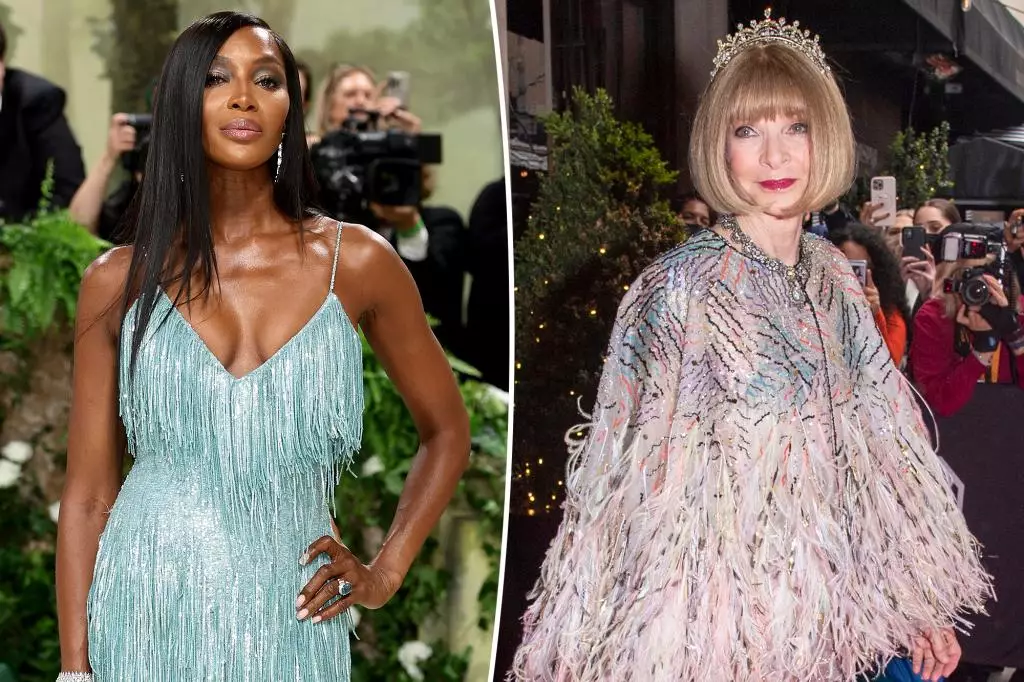The Met Gala has long been considered the pinnacle of fashion events, a night where the who’s who of the industry showcase art disguised as couture. Amidst the glitz and glamour, however, there are underlying dramas that often unfold outside the spotlight. Naomi Campbell’s recent announcement of skipping the 2025 Met Gala has raised eyebrows, igniting speculation about her tumultuous relationship with the event’s organizer, Anna Wintour, a name synonymous with both fashion authority and controversy.
With her announcement via Instagram, Campbell seemed to extend a congratulatory nod to Wintour and the fashion community while simultaneously taking a definitive step back. Her statement praised the theme, “Superfine: Tailoring Black Style,” highlighting the significant influence of Black culture on fashion. Campbell’s appreciation for this theme was telling; she recognized the dignity and power of Black expression as a critical narrative seldom highlighted in mainstream fashion discussions.
A Friend’s Legacy and Public Affection
Yet, underneath the sweetness of her message lurked the bitter tang of conflict. Campbell, despite acknowledging her absence with regret, made it clear that her decision was not taken lightly. This could easily be interpreted as a diplomatic response to an unspoken rift, considering her history with Wintour has recently become more publicized. Just months earlier, in a noteworthy incident at the 17th Fashion Row Fashion Show, Wintour subtly criticized Campbell for her tardiness—a sharp jab that was met with Campbell’s own veiled rebuttal.
While she was gracious in giving a nod to Wintour’s influence on her decades-long career in fashion, the palpable tension during that event suggested a frustrated friendship overshadowed by professional rivalry. Campbell’s tribute to the late stylist André Leon Talley, who worked ardently to elevate Black representation in fashion, only adds depth to her decision to skip the Gala. That’s where her omission became emblematic; Talley’s absence in the evolving fashion narrative perhaps made Campbell reconsider her affiliation with an event that has often overlooked voices like hers.
Supporting Roles and Personal Reflection
It’s interesting to observe how Campbell’s remarks about Wintour oscillated between gratitude and discomfort. The fashion industry thrives on personal stories, and Campbell’s narrative is a stark reminder of the complexities that often lie beneath the surface. While she expressed appreciation for Wintour’s role in nurturing her career from its humble beginnings, one cannot ignore the fact that gratitude in the face of a last-minute slight can feel more like a formality than a genuine sentiment.
In a world where relationships are often transactional, the volatility between Campbell and Wintour reveals the fragility behind fashion’s glamorous facade. Jodie Turner-Smith’s comment on Campbell’s Instagram post, expressing heartbreak for her absence, indicates that even friends in high places recognize the emotional toll that these glaring clashes can take. The camaraderie and support that female figures are expected to offer one another in such a competitive arena seem fractured, especially when the stakes are a global icon’s presence—or absence—at the Met Gala.
Beyond the Red Carpet: The Message of Black Dandyism
The theme of Black dandyism that Campbell highlighted deserves extensive discussion outside the Gala’s confines. The historical significance of this cultural movement is often overshadowed by the glitz of high fashion, yet it remains a cornerstone of numerous stylings that influence modern aesthetics today. By emphasizing this theme, Campbell calls attention to a narrative not just of celebration, but of a growing acknowledgment of the cultural richness and diversity that has been instrumental in shaping contemporary fashion.
Her decision to skip the event feels like an assertion of individuality and self-worth—an empowered stand rather than a defeat. In fashion, appearance often speaks volumes, but Campbell’s choice to withdraw can be interpreted as a statement against an industry still grappling with the weight of its inequities. It illustrates that sometimes, showing up is not just about physical presence; it’s about maintaining integrity and self-respect in a space that has historically marginalized voices like hers.
In this high-stakes arena where image is everything, Naomi Campbell’s absence could very well serve as a form of quiet revolution, challenging others to reexamine their relationships within the fashion industry, particularly in relation to race, power, and respect. Her words linger in the air as not just a message of personal absence, but as a broader commentary on the ever-evolving dialogue of diversity, expression, and acknowledgment in the world of style.

